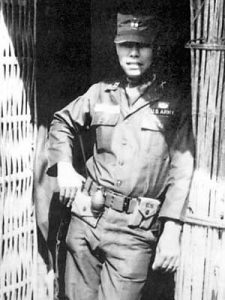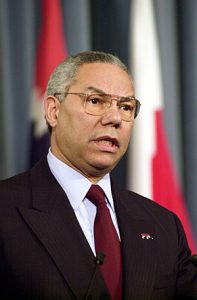Colin Powell is one of the most recognized figures in the American Experience of the late 20th century. Military officer, national security adviser, secretary of state, one-time potential presidential candidate, best-selling author, and more, Powell ranks among high as an influential leader in American life.
In this short article, I’d like you to focus on one thing about Colin Powell. I want you to learn more about his story in the Vietnam War, his recollection of that experience, and the takeaways from both for your leadership.
Powell served two stints in the Vietnam War, in 1962-1963 as a captain and again in 1968 as a major and staff officer. He helped train South Vietnamese units and later assisted in planning operations. He was wounded in the foot in his first stint, and was part of a severe helicopter crash in his second stint. In the crash, Powell rescued several men from the burning aircraft, saving their lives. He received a medal for his efforts.
Powell was also involved during 1968 in the aftermath of a horrific massacre of Vietnamese civilians by American soldiers. He wasn’t present at the scene. He insisted—and would always insist—that the event didn’t typify the conduct of the vast majority of American soldiers in the war.
The Vietnam War never left the mind, heart, and soul of Colin Powell. Later, in the 1980s under President Ronald Reagan, he would assist in developing a strategic doctrine—called the Weinberger Doctrine, after Powell’s boss—that allowed for using American military power only if it could be applied with overwhelming force in the pursuit of clear objectives. Still later, in the early 2000s while serving President George W. Bush, Powell would update this doctrine and give it a unique name—the “Pottery Barn Rule”. Powell stated that when you bring war to a region or a nation (such as Iraq), “if you break it, you own it.” Powell’s meaning was that the attacking military force would be responsible for restoring order, peace, and stability. His words were not immediately heeded in Iraq.
In any question of national security and armed power, Colin Powell consistently invoked his experience in Vietnam. He brought many other factors to bear as well, but his time in Vietnam remained fresh in his recollections and in his analysis.
Here’s the leadership point for you and me: an experience that leaves a deep imprint on you will likely guide, color, affect, and influence your leadership for years to come. It will serve you well, it will serve you ill, but it will serve you one way or the other in nearly every instance. My recommendation for both you and me is that we try to be conscious of the effect of such an experience and openly test whether or not it is applicable to the situation in front of us. All of us have our Vietnams.
Learn from Colin Powell.









